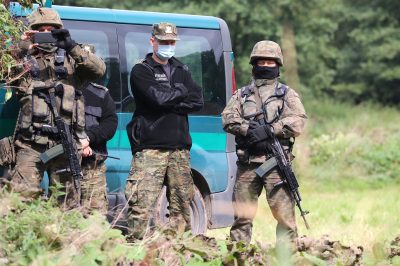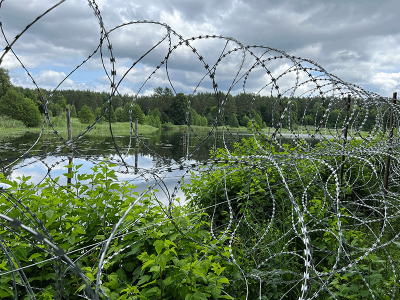
The District Prosecutor's Office in Hajnówka has filed an indictment in court against five persons who provided humanitarian aid to an Iraqi family and an Egyptian citizen on the Polish-Belarusian border. The persons assisting are charged with the offence of facilitating unlawful stay in the Republic of Poland.
Provision of humanitarian aid
The case dates back to March 2022, when the aid workers were detained and charged with organising the unlawful crossing of the Polish-Belarusian border. At the time, the prosecution demanded pre-trial detention, but neither the district court nor the regional court agreed.
Criminal proceedings
After two years of proceedings, the prosecutor's office changed the charges brought against the activists. One person was accused of providing food and clothing to persons who crossed the Polish-Belarusian border and allegedly provided the foreigners with information useful in case they were detained by Polish law enforcement authorities. This person is also accused of providing the foreigners with shelter. The other four persons were accused of transporting members of a migrant family "far into the country", when in fact the distance was shorter than twenty kilometres from the border.
According to the prosecution, the persons assisting met the statutory definition of the offence under Article 264a § 1 of the Penal Code, i.e. facilitating unlawful residence in the Republic of Poland. The prosecution claims that they acted intending to achieve a personal gain, not for themselves, but for the persons they were assisting. This offence is punishable by imprisonment of up to 5 years.
It should be noted that Article 264a of the Criminal Code implies that this offence can only be committed with the aim of ‘achieving a financial or personal gain’. Enabling or facilitating an unlawful stay, without the intention of achieving the purpose of a financial or personal gain, is not prohibited. It may be a matter of benefit to the person committing the offence or to another person, but it is difficult to accept that this other person could be the migrants themselves. In that case, any provision of assistance to a migrant would constitute a criminal offence and the content of this provision would make no sense.
Helping is legal
In HFHR's opinion providing humanitarian assistance does not constitute a crime. Selfless help to people in danger of health or life is a moral obligation and deserves praise, not criminal repression. Meanwhile, even though current criminal law does not criminalise humanitarian aid carried out on the Polish-Belarusian border, there are cases of harassment and criminal charges being brought against activists and activists involved in this aid, as well as residents of Podlasie. Such actions are taken despite declarations from the authorities that repression of activists must cease.
‘I found it hard to believe what I was being accused of, I didn't think there was such a law that said it was criminal to give food, drink, clothes and medicine to another person. If someone had told me about it, I would not have believed it. And yet now I am facing a court case and maybe even a sentence for having given people help, for wanting to take a family with children out of the forest. The Polish state is now prosecuting me for this, and I have the impression that we are all the scapegoats here, while the state services have already spent many billions on supposedly protecting the border, but have failed to break up the smuggling rings and have failed to solve the humanitarian crisis,’ says the accused Podlasie resident.
‘Our case is part of a broader policy aimed at deterring those who choose to fight for a dignified life through migration and those who provide migrants with humanitarian aid. As in other EU countries, supporting people on the move is criminalised in Poland. If we accept that basic assistance to people to whom the Polish and Belarusian states have nothing but violence to offer is being criminalised, then we should seriously rethink where we are as a society on the map of political ideologies,’ says one of the accused.
HFHR and the Szpila Collective provide legal support to those involved in delivering humanitarian aid in the Polish-Belarusian border region. The defence counsel for the defendants is lawyer Radosław Baszuk.


